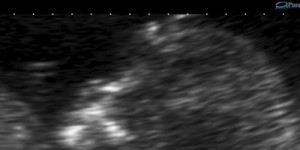 I have quite a few friends having babies right now, and as my facebook feed fills up with adorable baby pictures, I’m turning to reminders of pregnancy to help decide if this is REALLY something I want to do again. Jury’s out. BUT, there was a fascinating paper that just came out in Cell talking about two of my favorite things – babies and microbiology. (On a side note, I feel like the intersection of these two interests has a great deal of scientific and comedic potential.) Omry Koren and collaborators from Ruth Ley’s group at Cornell looked at the changes in the collection of bacteria, or microbiome, of pregnant women between first and third trimesters, as well as the microbiomes of their babies (Koren et al. 2012. Host remodeling of the gut microbiome and metabolic changes during pregnancy. Cell. 150:470). The microbiome changed drastically in the third trimester, resembling in important ways the microbiome of someone who has metabolic syndrome. Metabolic syndrome is characterized by insulin insensitivity, weight gain, and hormonal imbalances, and can lead to diabetes. Gestational diabetes is like a temporary metabolic syndrome gone mad – reduced sensitivity to insulin maintains high blood sugar, which is good for a growing baby, but can be very hard on the mother.
I have quite a few friends having babies right now, and as my facebook feed fills up with adorable baby pictures, I’m turning to reminders of pregnancy to help decide if this is REALLY something I want to do again. Jury’s out. BUT, there was a fascinating paper that just came out in Cell talking about two of my favorite things – babies and microbiology. (On a side note, I feel like the intersection of these two interests has a great deal of scientific and comedic potential.) Omry Koren and collaborators from Ruth Ley’s group at Cornell looked at the changes in the collection of bacteria, or microbiome, of pregnant women between first and third trimesters, as well as the microbiomes of their babies (Koren et al. 2012. Host remodeling of the gut microbiome and metabolic changes during pregnancy. Cell. 150:470). The microbiome changed drastically in the third trimester, resembling in important ways the microbiome of someone who has metabolic syndrome. Metabolic syndrome is characterized by insulin insensitivity, weight gain, and hormonal imbalances, and can lead to diabetes. Gestational diabetes is like a temporary metabolic syndrome gone mad – reduced sensitivity to insulin maintains high blood sugar, which is good for a growing baby, but can be very hard on the mother.
Here’s where the microbiology gets interesting though – the authors did show that the gut microbial communities of women in their third trimester resembled communities of people who are obese. And in fact, if you give germ-free mice the microbiomes of women in their third trimester of pregnancy, the mice get fatter than if they had a regular microbiome. This is a powerful way to demonstrate how the microbiome can affect health, and also suggests that some poor sod had to collect lots of poo, make it into a slurry, and somehow insert it into a mouse. I’m not curious enough to find out how that’s done. Somethings you can never unlearn. ANYWAY, the point is that the health of the mother is intimately associated with the microbiome. However, what’s really interesting is that unlike the microbiome of obese people, the bacterial communities of pregnant women actually became less adept at metabolizing sugar. So while metabolic syndrome in the obese may arise from chronically high sugar in the diet, resulting in bacterial communities that are good at metabolizing all that extra sugar, this study suggests that the metabolic syndrome-like-state of pregnant women is due to something else, perhaps constant inflammation. I think that how this insulin insensitivity arises is the truly important question, because the how of the question will help us figure out the why.
What may seem like a lovely adaptation on the part of the mother to care for her unborn baby might not be so lovely. Ed Yong, one of my favorite science writers, wrote a great article on this research, and concluded: “You could view this chain of events as an adaptation on the part of the mother. By manipulating her gut bacteria during pregnancy, she triggers the metabolic changes that will best support her growing foetus.” Another alternative point of view is this: what if it’s the baby that’s manipulating the mother’s microbiome for its own benefit? I’ve written before about genetic conflict between mother and child here and here. Fetuses release human placental lactogen (hPL) directly into the blood stream, contributing to insulin resistance and concomitantly increasing glucose levels in the blood. If fetuses manipulate the mother’s biochemistry to increase resources, could the fetus also be the driving force in modifying the mother’s microbiome?
In actuality, both hypotheses commit the common error of anthropomorphizing an evolutionary process. Some babies were more adept at manipulating their mothers’ biochemistry than others, and some mothers were more adept at drawing firmer boundaries. What has resulted over millenia of evolution is a delicate balance; a detente between the best interests of baby and mother.

2 Responses to “The Microbiome of Pregnancy”